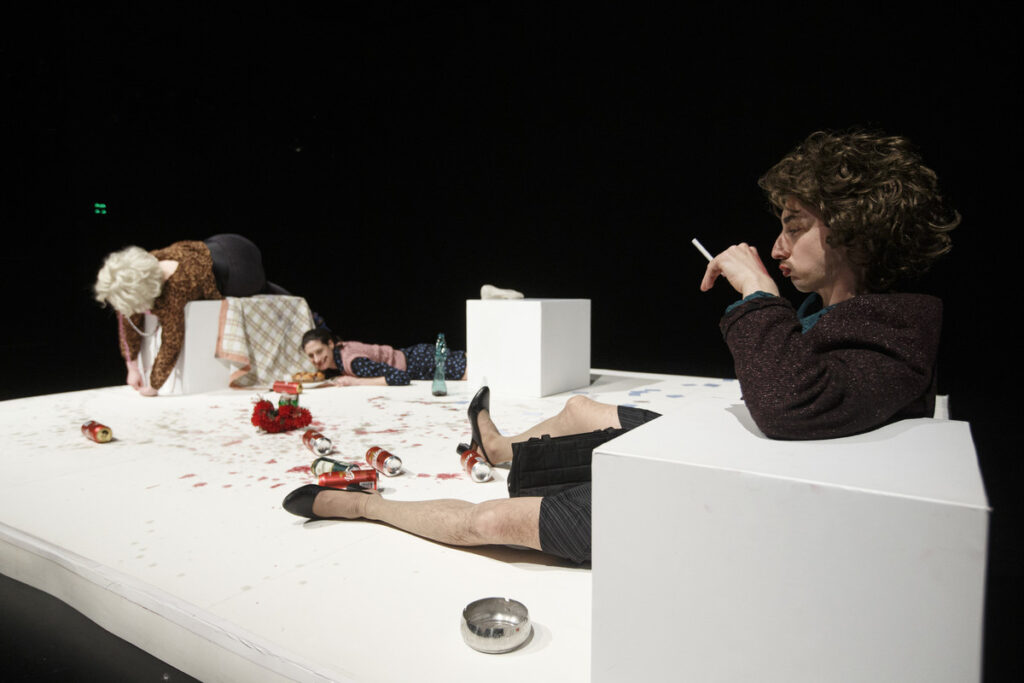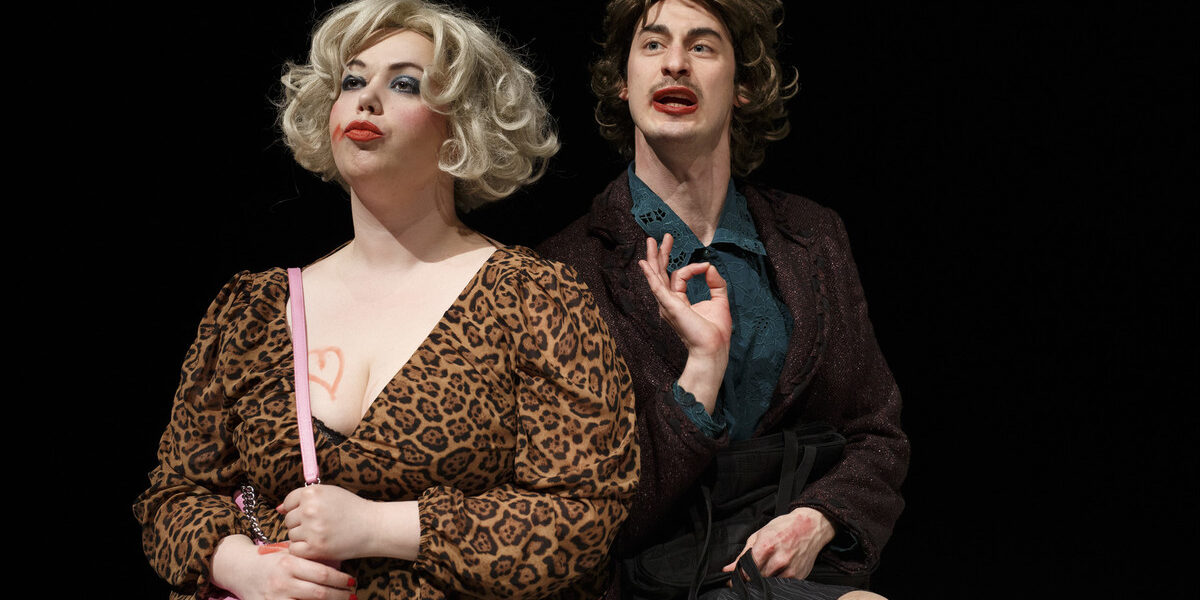Zavod Melara, premiere 15th February 2022 (part of 58th Maribor Festival)
Werner Schwab had a firework of a career, writing sixteen plays over a period of four years before his early death. The cover for the English translation of his furiously scatological, satirical 1990 debut Die Präsidentinnen shows three faces peering up from a toilet bowl which pretty much encapsulates the play and its approach. The play is the very definition of potty-mouthed. It contains more shit than that tunnel Andy Dufresne had to crawl through in The Shawshank Redemption.
Alternatively known in English as Holy Mothers and First Ladies (despite the quite different connotations), the play consists of conversations between three women Erna, Grete und Mariedl
Grete (Sara Dirnbek) is blowsy and slatternly, Erne (Žan Koprivnik) is uptight and also so tight with money preferring to use her neighbour’s old newspaper rather than buy toilet paper. She even listens outside the door when get drunken son Hermann is taking a dump to make sure he does not use too much paper. Mariedl (Miranda Trnjanin) is proud of her abilities as a cleaner, the fact there is no toilet she can’t unblock because, unlike others, she has no qualms about plunging her hand – without gloves – into blocked lavatories. Excrement does not disgust her, it is a product of the body, part of God’s creation. Erne cannot abide this kind of talk; if she had her way people would not have bums at all.
Director Nina Ramšak Marković places these three women on pedestals like exhibits, an unedifying triptych. In between the copious poo-talk, the women offhandedly discuss Austria’s Nazi past. Everyone was a Nazi back then says Grete, dismissively while Erna corrects her – no, no, there was only a handful of real Nazis, only a few bad apples, there is no reason to feel any guilt or complicity.
Schwab gleefully chisels away at the hypocrisy of the Austrian bourgeoisie mindset. It takes swings at Catholicism – the play begins with them excitedly watching the Pope on TV – and his country’s historical amnesia. The women are quick to judge others and have a capacity for cruelty that it doesn’t take much to bring to the surface. Mariedl is far more guileless in comparison, displaying immense pride in her lavatorial prowess.

Holy Mothers/Predsednice Photo: Željko Stevanić
After some vigorous yodelling from Dirnbek, the stage is strewn in food and booze as the three women, now worse for wear, embark on a shared fantasy. Grete’s involves being fingered, Erne imagines being courted by the man who sells her liver sausage, who she deems morally superior – the right sort of man – while Mariedl embarks on a reverie about her peculiar skill being called upon at a swanky society party. In her mind her absence of disgust when it comes to faecal matter is a sort of superpower, but the image of rich people looking on approvingly while she’s up to her armpit in shit is pretty indelible Even in their fantasies, the dirt creeps in – there is no escape even in dreams.
Trnjanin is exceptional as Mariedl, forever picking her teeth or fiddling with her skirt in a childlike way. It’s a very carefully constructed performance in terms of its physicality, and somehow gives the character a dignity even in the most filth-streaked scenes. She also navigates the hazards of playing a character whose simplicity could be read as having a developmental disability. Dirnbek and Koprivnik are also very good, mining humour not just from the text but from their posture, Koprivnik with his knees pinched primly together, Dirnbek with her lolling posture and majestic pout.
As a British viewer the production brought to mind the work of comedy troupe the League of Gentlemen, specialists in the grotesque. This connection is enhanced by having Koprivnik, compete with moustache, play Erne (the League also played all the female characters in their shows).
Class clearly lies at the heart of the play and there are times when it was necessary to question just who and or what we were being invited to laugh at in the play. In the infamous vomit scene in Ruben Östlund’s Triangle of Sadness, it’s the superrich who end up wading through their own effluence but here the characters are at the other end of the class spectrum. I also wondered if there wasn’t a degree of misogyny embedded in the text, especially in the way Grete is humiliated by underscoring her undesirability.
But, as demonstrated by her production of Elfriede Jelinek’s Women as Lovers, Nina Ramšak Marković is a director interested in both class and the position of women in the patriarchy. Schwab’s play uses ugliness to expose and explode ugliness, to dredge up the undercurrents of violence that lie beneath the veneer of social ‘properness’, the way that cleanliness can be used to camouflage the filth underneath, the stains that taint a nation.
Credits:
Director: Nina Ramšak Marković// Translation: Mojca Kranjc// Dramaturg: Milan Ramšak Marković// Lighting: Mojca Sarjaš
Cast: Žan Koprivnik, Sara Dirnbek, Miranda Trnjanin
For more information, visit: Borstnikovo.si
Further reading: review of Women as Lovers directed by Nina Ramšak Marković
Natasha Tripney is a writer, editor and critic based in London and Belgrade. She is the international editor for The Stage, the newspaper of the UK theatre industry. In 2011, she co-founded Exeunt, an online theatre magazine, which she edited until 2016. She is a contributor to the Guardian, Evening Standard, the BBC, Tortoise and Kosovo 2.0








